Ahead of the Women’s FA Cup final between Arsenal and Chelsea on 5 December 2021, to mark 100 years since the FA banned women’s football, I thought I’d bring forward this piece I wrote a good few years ago about that very issue…
Malcolm Gladwell explained in Outliers why talent is not what takes a person to the top. He shows that where you come from and when you’re born is just as important, but his theory also translates across gender lines and helps explain why women’s football still struggles.
That, and the FA banning the game for 50 years.
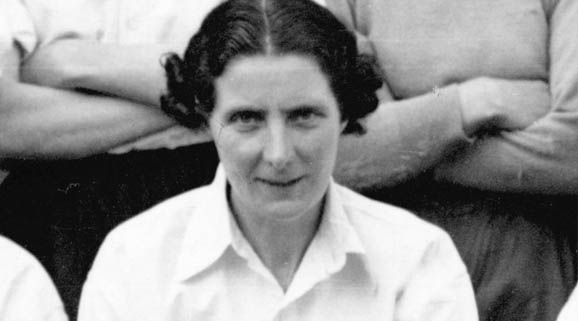
Let me explain…
From she could walk she was trying to kick a football. As she grew independent enough to be allowed outside with her peers, she was on the streets playing football until her mum would shout that it was time to come in for dinner. Then followed a competition to stuff the food into her face as quickly as possible to get back out on to the streets to play football again. It didn’t matter if 20 boys were playing or just one, all she wanted to do was play.
At primary school, Sarah wasn’t allowed to play in actual games so amused herself playing during break and lunch. Her friend, David, wasn’t anything special with the ball at his feet, but because he was male, he was afforded the chance to play in a team and learn about the game at a slightly deeper level. He got to play more and when he talked about football adults engaged with him. Some encouraged and challenged him, others praised his ability. When Sarah spoke about football, most adults humoured her or thought it ‘cute’ that she was trying to talk about what was clearly a ‘man’s game’.
When it was time to go to secondary school, Sarah was sent off to an all-girls’ school. Although it was academically superior to the school David joined and had a healthy and extensive sports programme, football was not on offer. This was 1986. Girls didn’t play football then. At last not here.
David, however, went to a school that had a decent football team and he was quickly on the fringes of it. Although still not anything spectacular, he was willing to work hard and coaches started to offer him places in sessions after school. He started to develop the technical side of his game and, by the end of the first year, after he had extra coaching while Sarah hasn’t even kicked a ball, a cavern emerged between the perceived footballing ability of the pair who were identical just 12 months earlier.
These two people don’t actually exist. They are a composite of people and situations I knew growing up but the story is a clear example of how some men go on to be superior when it comes to playing football and why, as a result, we continue to feed the circle that keeps inequality in play.
We can point to puberty and the release of hormones as one reason many people think men are better at football than women (and I realise that’s a massive generalisation, most men won’t be anywhere near as good as women who play the sport professionally) but that would merely explain why men are stronger than women. The ability to control a football and make it move where you want it to in a way you determine is a learned skill. It doesn’t depend on what hormone is in your system or what genitals rest between your legs.
The simple reason the women’s game has not reached the same level as the men’s is because it is not taken seriously enough and the media think there isn’t any interest. Boys are regularly offered opportunities denied to girls, they are encouraged to play football while girls are still discouraged. These things matter, small as they are. When they combine, they result in a massive distortion.
It wasn’t always like this.
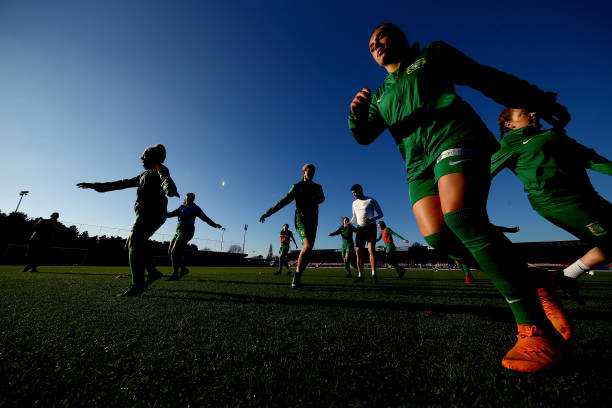
Football hasn’t always been with us, although it often feels like that. It’s a game that nobody – male, female nor non-binary – knew how to play before 1863. By 1920, some women’s games were attracting over 50,000 supporters and some grounds were too small to cope with the demand to watch them play.
Contrast that with today where one of the stated aims of the rejigged Women’s Super League was to increase regular gates to 2,000.
So how did that happen?
How did a sport, that was once engaging enough to generate demand that could not be met, fall so low that it now struggles to get much broadcast coverage and often sees just a few hundred turn up at games?
Lily Parr was a player who had a shot so fierce she once broke the arm of a male goalkeeper. The first female player to be sent off for fighting, she stood over 6ft tall and scored more than 1,000 goals in a career that spanned 31-years. She debuted at 14 and scored 34 goals in her first season.

Along with some other factory workers from Preston, she formed part of the Dick Kerr Ladies, the biggest draw in world football but they started at a time when many men who would have been playing were off fighting in World War I. Although women’s football had been in place prior to the breakout of war, like with so many other industries, it was only when the country was desperate did they allow women to fulfil roles traditionally serviced by men. Those women then, of course, surprised many by being more than capable of doing whatever that was asked of them.
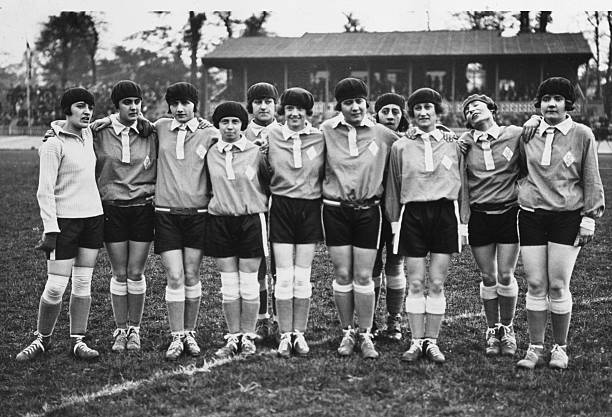
Informal kickabouts started at factories but as the war wore on, the game became more formalised, and games, that started as a novelty, soon became established as people willingly turned up to watch because of the skill of the players.
When the war came to an end people continued to turn up to watch women’s football in their tens of thousands. But the establishment wanted women back in the kitchen, where they belonged. If you’re female and involved in football today, chances are you already know that’s where you’re supposed to be.
None too pleased at this new-found freedom women had been handed, the FA declared football unsuitable for women in 1921 and called on clubs belonging to the associations “to refuse the use of their grounds for such matches.” It didn’t matter that their war effort had been every bit as integral as the men fighting on the front, women would not be allowed to continue in this manner.
Today, almost 100 years later, the women’s game is still fighting to recover.
Those years show us clearly there is an appetite to watch women’s football from the general public and that women, as we see clearly today if we pay enough attention, are more than capable of producing football that entertains the masses.
But if you stopped a random sample of men on the street and asked them about women’s football, they would be clueless. Women just aren’t as good as men and that’s all there is to it. It is, after all, a ‘man’s’ game.
It’s not and never has been but to break the cycle we find ourselves in, something is going to have to give. Either the media need to start giving women’s football significantly more coverage to show the public that this is something they should care about, or the public needs to change its mind all by itself. That hardly seems likely.
The FA didn’t lift the ban on women’s football for 50 years.
TV wasn’t invented until six years after women’s football was banned. The BBC only introduced colour television four years before it was restored. It’s no wonder the public have no interest.
By the time women were allowed to kick a ball again the men’s game had seen untold investment and exposure.
I wonder if anyone back before the launch of the Premier League said, ‘it’s probably not worth it?’
5 reasons female Arsenal fans should stay in the kitchen
by Helen Trantum
Hey! Goonerette! Where’s my sandwich?
After reading Nia Griffith’s piece on some common attitudes to female Gooners (that you can read below), I wanted to talk through some of the reasons that are commonly given for why women have a lesser place in the footballing world than their male counterparts.
Some of it is tongue in cheek, some of it is deadly serious, but almost all of it is a generalisation.
Just as not all Goonerettes fall foul of these five reasons, nor do all men think or behave according the them.
Whatever your perspective, enjoy.
Women just don’t get football

‘If you don’t understand what’s going on (and you don’t) then either keep quiet or go somewhere else – like the kitchen. I just want to watch the footy in peace’
We’ve all heard the jokes about women who don’t understand the offside rule.
From the comments from fellow fans around me at games or in the pub, it seems that this is not exactly restricted to female supporters by any stretch of the imagination.
The truth is that in some ways, the fact that Goonerettes have to work so hard to convince everyone that they’re credible probably means that the ones you most likely come across are actually dedicated students of the beautiful game.
The real question is at what point did understanding the finer points of a sport become an integral part of following your team?
Take rugby – I’ve never followed it, I’ve never learned the rules, I even find it a bit boring – in short, I know sod all about it.
Ultimately my lack of knowledge does not stem from my gender, but instead from my lack of interest. In any case, it doesn’t stop me supporting England or the Lions, just as my lack of permanent interest in skeleton racing or golf doesn’t stop me supporting Lizzy Yarnold at the Winter Olympics or Europe in the Ryder Cup.
Women don’t play football
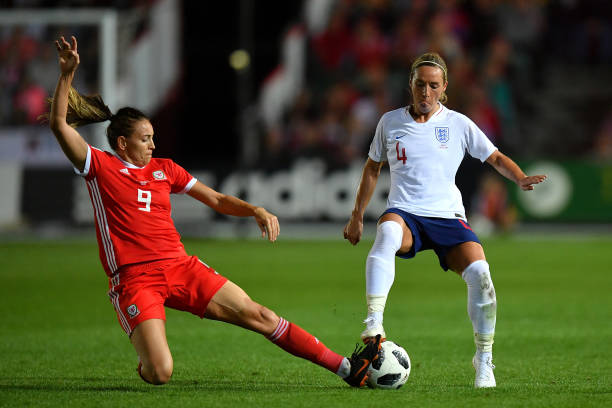
“You’ve never played so how would you know? Go make me a sandwich.”
Now where do we start with this one?
If we look at pundits, while there is a trend towards ex-pros particularly from a marketing point of view, there are still a few who have never played.
Certainly there are still a fair smattering who have never played at the top level, and, let’s face it, the standard of punditry is in a pretty sad state with the likes of Michael Owen deemed fit to grace our televisions.
Yet this need to prove your credentials prevails.
The truth is that the youth football opportunities for girls are significantly more limited than for boys of the same age, both casually and in formal programmes. More importantly, the attitude towards girls who want to play football is massively more prohitive, whether from the lads on the street or the coaches at the clubs.
For those who make it through this difficult period, there is a thriving university football scene in spite of the various stigmas attached with being a female footballer, such as accusations of looking ‘butch‘ or like ‘men in drag‘.
Translate this into longevity, and it is hugely more difficult to make a living in women’s football, certainly one that would sustain a player past retirement.
Take Arsenal ladies – more successful than the men’s team by some distance in recent years – a trailblazer in the women’s game as the first professional team, and until recently the only ladies team paying enough to allow players to give up other part-time jobs, let alone put some aside for when their careers end and they need to retrain.
Compare this with the men’s game, where increasing numbers of Conference teams are fully professional.
Women support teams for the wrong reasons

“You should just support the same team as your bloke, rather than because your pet rabbit is called Bubbles. Now, where’s my vanishing spray?”
The best thing to come from the vanishing referee spray. pic.twitter.com/mnZknRko8E
— Not Match of the Day (@NOT_MOTD) June 20, 2014
Let’s say you go to the horse racing or the greyhound stadium – what logic do you use to pick the horse or dog on which you place your bet? For some, it will be a calculated decision based on form, weight, trainer.
For others, it will be because of a name or a colour.
Now think about what made you start supporting Arsenal.
I’ve been a Gunners fan my whole life – the football has always been on in my house so I’ve never even had to think about it.
I remember when I was nine, I was kept in at lunchtime at school because I was the only one in my class who didn’t want Man Utd to win the Champions League Final.
I remember aged 11 sneaking downstairs to watch the penalty shoot-out in the UEFA Cup Final.
I remember my first shirt (the JVC one with the blue stripes) and my first live game (Arsenal vs Chelsea, FA Cup, 2004).
I remember the pain of being stuck in a jubilant Tottnumb stand as they smashed us 5-1 in the then Carling Cup and I remember the ecstasy of being in the heart of the Gooner crowd at last season’s FA Cup final.
I also remember my cousin choosing to support Liverpool because their shirt sponsor at the time was Candy, and I remember my brother choosing to support Everton and Scotland because they played in blue.
He later changed to Chel$ki as he thought they were a “better blue”.
I suppose the point is that it doesn’t matter your reasons for choosing your team, what matters is what makes you stay.
Football is too rough for women
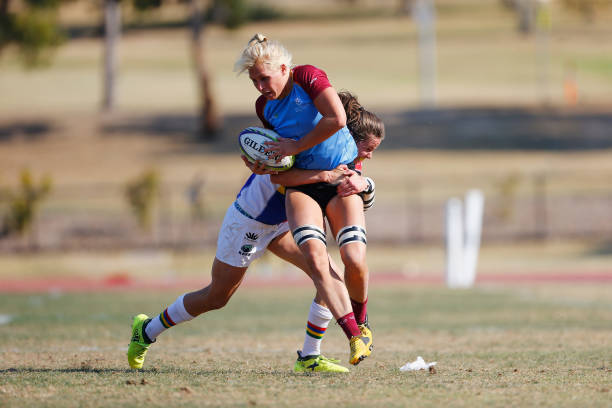
“You might get upset and collapse in a heap if someone so much as makes a tackle, and I haven’t got time to wave the smelling salts when there’s a game on!”
It has always struck me as odd that female fans are more welcomed at rugby games where incidents such as eye-gouging and stamping are not uncommon occurrences, whereas they are so much less welcome at football games, where the sight of head bumping, happy slapping and egos posturing is the more usual fare.
Besides, even if football was rough, that wouldn’t mean that someone can’t enjoy watching, just because you wouldn’t like to be on the receiving end.
The same is probably true for the majority of men watching in the crowd or at the pub.
It’s a bit like watching horror films or war films – just because you wouldn’t want to be chased by a chainsaw-wielding madman or be shot at by a marauding machine gunner, it doesn’t mean you don’t want to watch the film.
Women spend all game ogling the players
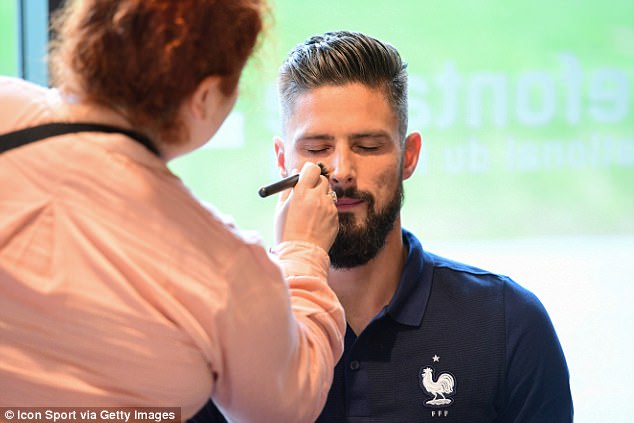
“Do you have to talk about Giroud’s bum/hair/general gorgeousness when there’s a game going on? They’re players not porn stars!”
It’s true – when you put 22 men in peak fitness on a field, and 11 of them even wear your team’s colours, chances are that at least a couple of them are going to be worth a second look.
If roles were reversed, there are a lot of men who would be doing the same – you only have to look at the Football Fittie hashtag that does the rounds on a Wednesday night.
The thing is, Arsenal do have quite a prevalence of rather attractive players too (sorry, Gabriel, you’re not one of them), but it’s not as if any women watching the games just drift off into some sort of sex-induced daydream every time Oli or Alexis enters their field of vision.
When play is stopped, so what if a few of them do enjoy a little eye candy? Don’t kid yourself that blokes would be any different (ask them about Emma Byrne or Hope Solo).
After all, that’s exactly why Crystal Palace have cheerleaders at half time.
We live in a world where it’s socially acceptable for a man to read a paper on a train where women’s naked bodies are openly advertised so if you’re seriously bothered about a little physique-admiring of elite athletes then you’re probably too easily offended.
Besides, how many times have you heard a bloke remark that he’d happily have Alexis’ babies?
Exactly.
WHO AM I?
Much of this article is tongue in cheek, and although you can probably tell my gender from the fact that I have written on this topic in the first place, the points made could have come from anyone, irrespective of whether they are male or female.
Growing up, I had posters of the likes of Thierry Henry and Cesc Fabregas adorning the walls of my bedroom, but that isn’t exactly a sole female preserve.
I’m personally very used to bucking trends – it always amuses me how if I chip into a football conversation with a group of men that, typically, my first few comments are ignored, and then followed up with remarks such as “wow, you really follow football don’t you?”
As well as amusing me, that surprised reaction also slightly depresses me in truth.
Are women who are prepared to speak out really that few and far between?
Everyone should be able to be themselves, irrespective of gender.
Then again, that’s not a football-specific issue – I see a very similar response when people find out I studied physics at university.
Social pressures build up over time until they become embedded.
Up until I was about 13, I lived on a street where there were eight boys and me of a similar age, but in spite of the fact that I could more than hold my own, every so often someone would assert that I shouldn’t be allowed to play because I was a girl, particularly as we all got older.
Some of those fights didn’t end so well – injustice is a powerful motivator.
Likewise, the prejudice in the more institutionalised football communities was also pretty scary. The football coaching I attended as a small child ended at around seven or eight because they stopped allowing the girls to play with the boys at that point.
At primary school I captained the mixed football team, yet I wasn’t allowed to play in the playground games at break times because it was deemed too dangerous.
Increasingly these attitudes transferred to my peers until boys thought it was no longer “cool” to let me play and girls though it was weird that I wanted to.
I’m ok with being a bit weird, but that’s not true of everyone, and it’s depressing to think how many girls are discouraged from playing or even watching a sport they love because of other people’s attitudes.
EVERYONE IS BORN, BUT NOT EVERYONE IS BORN THE SAME
(Yes, I actually got a quotation from Matilda in! What a girl!)
Of course, Goonerettes have the same issues as their male counterparts – some have their own carefully considered opinions, others spout the latest fashionable opinions they overheard in the pub, others don’t want to void an opinion at all and want to enjoy watching without thinking too much.
Really what I am defending, as Nia did earlier this week, is the right of our female fanbase to hold – and voice – those opinions.
As long as I’m treated as an individual rather than defined by my gender, I don’t much care if I’m the only girl in the world who wants to watch football.
Somehow I doubt I am though.
We certainly don’t have to agree, but we should all be able to argue and debate without having our opinions disregarded for superficial reasons.
Every Arsenal fan is different.
Some are tall, some are short. Some are collecting their pensions, some have just bought their first replica shirt. Some go to every game, some get up at 3am to watch games on a dodgy stream. Some think Arsene should stay, some think he should go.
Some are male, some are female, some are even transgender.
The one thing that we all have in common is a love for this football club, a love that should bring us together not divide us.
We face enough opposition from outside the club already.
The condescension of female football fans
by Nia Griffiths
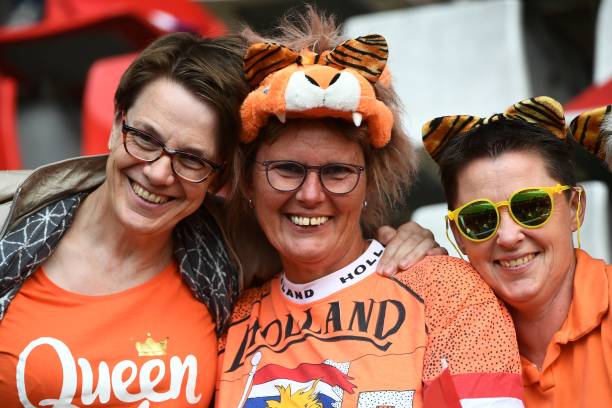 Almost three years ago, one of my first features for Daily Cannon was about the condescension of female football fans.
Almost three years ago, one of my first features for Daily Cannon was about the condescension of female football fans.
As a female Gooner, I wrote from personal experience about how women often have to answer a 100-question quiz on the history of world football if they just so happen to mention that they enjoy watching the sport. Whereas, as I say in my previous piece, “any bloke can seemingly fart his way into the conversation without as much as a raised eyebrow.”
Not being taken seriously as a female fan isn’t just about pride, although of course that’s involved to a certain degree, it’s about how quickly women can be completely written off and nodded out of a conversation if men don’t deem them as worthy.
If I misquote a manager, forget something that happened in the weekend’s game or make a mistake when using statistical evidence, it’s because I’m not as clued-up as men about football. If a man does the same, he’s only human – it’s just a mistake.
As a female football writer, I’m often pulled up about nothing more than human error far more than my male counterparts. And, after speaking with over 100 women who are every bit as passionate as men about football, I’m confident in the fact this isn’t sheer coincidence.
When I set out to rewrite my original piece published almost three years ago, I wanted to simply pen an up-to-date version given my experience in the field. And by ‘the field’ I mean at the matches, on the internet and in the pub. However, when I put out a call to arms on social media, asking women to share their individual experiences of what female football supporters face, the response was, quite frankly, overwhelming and this new piece took on a life of its own.

Firstly, let me begin with how I personally became a football fan.
My family are Manchester United supporters and I grew up in a Chelsea-supporting village in Surrey, not far from where the Blues train. As a result, I’ve always been around the sport and although I had very little interest in it as a youngster, this changed when I hit my teenage years. My friends were happy to teach me about the offside rule, which until this point society had led me to believe was practically quantum physics if you had a tiny woman’s brain, as well as formations, players, the Premier League and trophies.
Despite often watching games with my Chelsea-supporting friends, I soon found an affinity with Arsenal. As cliché as it sounds, I liked the way they played and I held a fondness for Arsene Wenger and his unwavering class. Before long, I was going out of my way to watch games, openly conversing with people about how amazing Eduardo was online and religiously soaking up content from a certain Arsenal website known as LadyArse.com.
Several years later, I would find myself writing for the same site, which is now Daily Cannon.
Something I’ve noticed whenever telling people, especially men, that I’m a football writer is my compulsive need to immediately follow this with the fact that I actually earn my living doing this and do so full-time. As if writing about football for fun makes me less qualified to be a fan. This is something I’ve noticed with a handful of women I’ve spoken with. If they’re a season ticket holder, this is something they often feel the need to interject, as if just being a casual fan – as men so often are – isn’t good enough.
“I would always introduce myself as an ‘Arsenal season ticket holder’ rather than an ‘Arsenal fan’ to immediately add some credibility,” Helen, a fellow writer for Daily Cannon told me, “which perhaps speaks volumes in itself.”
It’s something that I didn’t even realise I was doing until other women pointed out that they do the same thing. They don’t feel as if they’ll be taken seriously as ‘just’ a female fan, so they have to embellish their position in order to. They’re so used to getting shrugged off, they don’t even realise they’re desperately seeking approval.
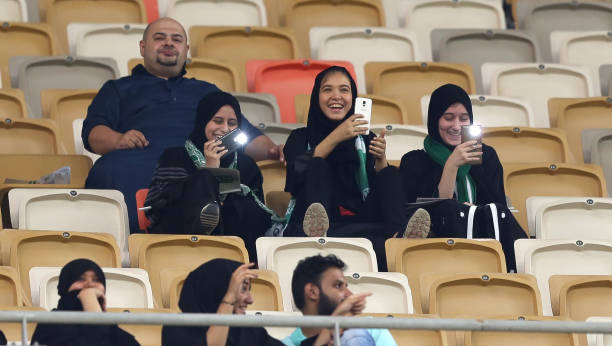
Even looking back at my original piece, I cringe because I’m so desperately trying to come across as witty. Almost as if I’m afraid to actually sit down and say to a mostly-male audience, “Look, some of you can be sexist as hell and it’s actually not a laughing matter.”
Not being taken seriously when you actually want to be is frustrating and although it’s one of the less-harmful ways in which female football fans face discrimination in the sport, it’s rooted in misogyny. Sports – especially football – are for men. Except maybe ballet dancing.
Women don’t like sports; they like make-up and fashion and clothes and having babies and making sandwiches. Sure, a lot of us like those things, as do men, but just like our male counterparts, we’re not one-dimensional. It’s possible for us to have further interests outside of the kitchen. Mind-blowing, I know.
The problem is, by perpetuating these seemingly silly stereotypes, we’re also perpetuating an ideology.
And if you’re a man reading this thinking, “Nonsense – that’s archaic. I would never tell a woman to get back in the kitchen! Women are great!” Read on. Because sexism isn’t as black and white as you either are or you aren’t. You can hold sexist views and not even realise it. Just like you can against any other oppressed group. Certain ideals are instilled in us from a young age by our parents, books, films and the media in general. When you’ve grown up with an idea deeply embedded in your brain, it’s hard to shake. Most of the time, you won’t even realise how harmful this can be.
Sometimes, people don’t realise they’re even being sexist at all.
For example, I once met a work associate of my dad’s. We were out in London having a drink and my dad informed him of my profession. His first reaction was to raise his eyebrows admirable, which I find pretty patronising but I’m used to it, before asking me which team I support. Arsenal, I obviously answered.
“Okay, well, which team do I support then?” He paused before slowing right down. “We’ve won the Champions League FIVE times.”
I imagine it’s a similar response to ‘tell me a joke’ when someone informs you they’re a comedian. Of course, I knew the answer, but if I hadn’t, what was he going to say? I shouldn’t have my job? You should find another career? Did he think I was trying to swindle him?
The man in question meant no harm and when I answered him with ‘Liverpool’ without hesitation he grinned and nodded approvingly.

More importantly, if my brother, who was stood next to me at the time, had told him he was a football writer, I highly doubt he would have been subjected to the same exam. It would have been a given that he knew what he was taking about and the conversation would have moved on. And the crux of it is because he’s a man and I’m a women. And therein lies the problem.
This was a huge problem the overwhelming majority of the women I spoke to for this piece revealed. Many find it difficult to be taken seriously in their love of the sport by the men in their own family and even some women buy into the idea that perhaps we just follow football to ogle the men. But female sexuality and men’s somewhat ironic desire to quash it is a topic I’ll come to at another point.
“The most depressing thing for me has not being taken seriously by my dad and brother even though it’s the one thing that unites us all,” said one female Liverpool fan. “Even though I follow the game keenly and think I’m reasonably switched on to tactics/formations/form etc. I’m never allowed to contribute to a discussion.”
So you see, at one end of the scale, we have women not being taken seriously, which isn’t just a football-related problem, even in 2018. However, mighty oaks from little acorns grow. At the other end of the ‘scale’ (of course sexism is sexism but bear with me), we have women who have actually been groped, abused and ostracised because of their gender.
The number of women who came forward to speak about their experiences who revealed they had been groped at a football match wasn’t just disappointing – it was alarming. Especially as some of this groping was from people of power, disguised as ‘security checks’ when entering a stadium. Groping that no one has bothered to report because, as female football fans, they’ve learned that they’re very rarely taken seriously.
Abuse shouted by opposition fans in their direction is often sexist. As if their gender is the easiest thing about them to mock and that being female alone is so degrading that it’s warrants being bullied. They’re often told to get back in the kitchen or asked what they’re even doing there. Obviously, when it goes unnoticed and unpunished, even by fellow fans, the chants only escalate.
“Only the other day it was half time I was stood waiting to be served in the concourse and two men behind me continued to shout things and touch and harass me and as most people around are men it gets unnoticed and unquestioned often,” revealed one of the 100+ women who reached out to me.
Of course, there were a handful of women who came forward and revealed that they’d been going to football games their entire life. Although they sometimes get the odd raised eyebrow in the pub, at the matches, they’ve mostly had positive experiences and it was refreshing to hear. Going to watch your team play shouldn’t be a risk to your safety, especially because of your gender, the colour of your skin or your sexuality.
Some women admitted that while they did get abuse at first, a select amount of men around them would call out sexist behaviour, which made a massive difference. It’s pretty telling that men have to be told they’re being out of order by other men in order to stop. However, this is the example most men need to follow. If you see sexist or discriminatory behaviour of any kind – call it out.
When this type of behaviour goes unchecked, it only gets worse, as one woman, who wishes to remain anonymous, revealed to me.
The woman in question was part of a football supporters group in the US and, when it became clear that she wasn’t willing to sleep with any of the men involved in said group and was in fact purely interested in football, she almost lost her membership.
It’s pretty transparent that men condemn women who dare to potentially find certain male footballers physically attractive while actively trying to have sex with them themselves. Almost as if they only want women to be sexual beings and explore their sexuality if it’s on men’s terms… funny that. We CAN be a football fan but only in the way they want.

Women can’t enjoy a sport and find players attractive at the same time (those damn tiny female brains again). But hey, Sepp Blatter, the president of FIFA at the time, was allowed to publicly say that female footballs should wear tighter shorts in order to make their sport more popular…
Go figure.
Unfortunately, even this is ‘sedate’ when you look away from the Western World. One Iranian female football fan told me that women still aren’t allowed to enjoy football matches in her home country. Some have even resorted to dressing as men to get in and show their support for the team.
“Outside of my own family, a lot of men make fun of me or say offensive things when I share my love of football with them,” she said. “They say things like ‘how a girl can love football?’, ‘You don’t even know how to play’, (which is not true, I am a very good midfielder), ‘You just love football because of good looking players.’
“I cannot, not watch football or play. Being an Arsenal fan since the age of two and a Real Madrid fan since 10 made me a person who cherishes everything in this game.
“In Iran women can’t go to stadiums and watch football, it’s forbidden but there are a lot of us who just want to go there and have fun and cheer our local teams. We have to stay home and watch from TV.
“There are some women who dresses as boys and go to stadiums, sometimes they can pass the security but most of the times they get caught and police will escort them out and fine them.
“Women in my country are really into football, there are so many that you would be surprised at how sexist men can be when a woman talks about football.
“I used to wear my Arsenal sweatshirt to university and boys started to make fun of me.
“I know more about football than any of them so I could handle it but there are some girls who bottle up their feelings for this game because they feel ashamed or they don’t want stupid comments to be thrown at them.”
It’s clear that something has to change. Although there has been an improvement, which some of the older women who messaged me pointed out, the fact that we’re still talking about this in 2018 is seriously disappointing.
So, how can we help? Keep talking about it, keep making a fuss, don’t just ‘get over it’ or feel you have to put up with it. Don’t feel as if your voice isn’t worthy of being heard. You deserve to feel safe watching your favourite team play a sport you enjoy. And you deserve to do so while not being harassed.

We need to hire more female football writers, presenters, pundits and experts. And not just to report on the women’s game.
We need to take women seriously when they put forward an opinion and allow them to feel safe to do so without being patronising, which honestly isn’t that difficult.
You need to call out behaviour when you see it – make people know that it’s not okay.
Mostly, we need to stop viewing football – something that everyone enjoys – as a ‘man’s sport’.
As one woman who messaged me said: “Don’t make it a boys club. That’s the only way people will start accepting and normalising it.”
Men really do have it easier than women, here’s how I know
By Lee Hurley
One of the great’ things about always knowing you were meant to be born in a male body but having to spend most of your life in a female one is that you get to experience a lot of things from both sides.
Early on into my transition, it was painfully obvious that men, if you missed the memo, have this life thing a lot easier than women.
One of the common responses from men, when they learned of my transition, was ‘good luck with shaving, it’s a real pain’ because that’s clearly all this transition involves – growing facial hair.
It might be a pain, but what is an *actual* pain is bleeding to death for five days every month coupled with massive oestrogen-induced migraines which make you want to saw your head off at the neck.
Emotions, that have you crying because you accidentally killed a fly that, just a few moments ago you swore had been sent here by the devil himself to torment you, are the cherry on top.
As for the cramps, imagine being kicked in the balls every five minutes for around 36 hours and you’re almost there.
No more of that thankfully.
Men have it easy.
So far, the only downside, and I use that word very lightly indeed, of the male hormones has been an ever-increasing libido. Testosterone is the nuts. It increases your confidence and body strength, chills you the f*ck out and makes you think you are magnificent.
I know that’s not just me.
Those who think it causes roid-rage have clearly encountered people who had anger issues to begin with. I’m so Zen, you’d probably want to punch me.
As for being treated like a guy instead of a woman? So I don’t get let on the bus first anymore. That’s a small price to pay for not fearing I might get raped instead.
Even the abuse I receive online is different. And I used to get a *lot* of abuse as anyone who follows the Daily Cannon Twitter account will know.
I no longer receive gender-specific insults. A few guys have said ‘look at the state of you’ in regards to my looks, but that’s it. The insults are a lot less specific. I no longer get told I don’t know what I’m talking about simply because of the genitals I was born with and the way society decided to raise me. People also want me to go to the kitchen a lot less and their ironing seems to have ironed itself. Bonus and bonus.
I’m the same person, my views haven’t really changed. They just aren’t as easily ridiculed now because I’m more socially acceptable writing about football as a guy. It’s sad, but I’d always suspected that might happen and now I know.
If only they knew I was trans!
In fact, it says it right there in my Twitter bio, but most CIS people (that’s people who have a gender identity which matches the one the doctor assigned to them when they popped out of their mum’s womb) don’t even know what that means.
They see it and either ignore it or think I ran out of characters and was trying to spell a longer word. Maybe they think I’m a transformer. Robot in disguise. Sort of. Not really. How cool would that be?

